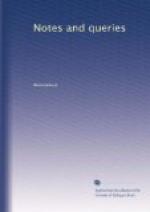“That the existing usage of excluding strangers during a division, and upon the notice by an individual Member that strangers are present, has prevailed from a very early period of parliamentary history; that the instances in which the power of an individual Member to exclude has been exercised have been very rare: and that it is the unanimous opinion of your committee, that there is no sufficient ground for making any alteration in the existing practice with regard to the admission or exclusion of strangers.”
This Report confirms the statement of Mr. Ross (p. 83., ante), that within his experience of thirty-one years no change has been made in the present rule of the House upon this matter, which, it would seem, dates very far back. The Speaker was the only witness examined before the Committee, and his evidence is not printed.
Arun.
* * * * *
REPLIES TO MINOR QUERIES.
Morganatic Marriage (Vol. ii., p. 72.).—According to M., Ducange has connected this expression with morgingab; but I have looked in vain for such connection in my edition of the Glossary (Paris, 1733). The truth most probably is, that morganatic, in the phrase “matrimonium ad morganaticam,” {126} was akin to the Gothic maurgjan, signifying, “to procrastinate,” “to bring to an end,” “to shorten,” “to limit.” This application of the word would naturally rise out of the restrictions imposed upon the wife and children of a morganatic marriage.
C.H.
Umbrellas (Vol. i., p. 415. 436.; ii. 25.).—In Swift’s description of a city shower (Tatler, No. 238., October 17. 1710), umbrellas are mentioned as in common use by women:
“Now in contiguous drops the flood
comes down,
Threatening with deluge the devoted town;
To shops, in crowds, the daggled females
fly,
Pretend to cheapen goods, but nothing
buy;
The Templar spruce, while every spout’s
abroach,
Stays till ’tis fair, yet seems
to call a coach;
The tucked-up sempstress walks with hasty
strides,
While streams run down her oiled umbrella’s
sides.”
H.B.C.
U.U. Club, July 2.
Bands (Vol. ii., pp. 23. 76.)—Scarf.—I was glad to read Arun’s explanation of the origin of the bands now worn by the clergy; which, however, seems merely to amount to their being an adoption of a Genevan portion of clerical costume. That they are the descendants of the ruff, there can be no doubt, just as wrist-bands have more recently succeeded to ruffles.
I cannot resist mentioning that an ingenious friend suggested to me, that the broad, stiff, laid-down collar, alluded to in the former part of Arun’s communication, possibly gave rise to the modern band in the following manner:—When the scarf, still in use, was drawn over the shoulders and hung down in front, that part of the broad collar which was left visible, being divided up the middle, presented a shape and appearance exactly like our common bands. Hence, it was imagined, this small separate article of dress might have originated.




